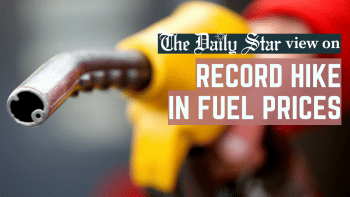The energy policy is becoming increasingly illogical

Ordinary people, particularly those belonging to the middle- and lower-income groups, have been dealt another major blow as bus and launch fares were increased, albeit predictably, following Saturday's record fuel price hike. We had warned repeatedly that raising fuel prices by such high amounts will have many negative consequences for the public. And increased bus and launch fares are just the beginning.
This practice of increasing domestic prices when international prices are high, but never lowering them when those are low, has to go.
A day after exorbitantly raising prices of diesel, kerosene, petrol and octane, the government hiked bus fares by up to 22 percent. Although the new fares were supposed to come into effect on Sunday, bus operators started charging them immediately after the announcement. Moreover, many vehicles were kept off the road on Saturday following the price hike decision. This meant that commuters had to suffer the entire day due to a shortage of transport, while also getting overcharged for using the few vehicles that were available. All of these were foreseeable from past experiences. Yet, the fact that the government had no preparation to address commuters' suffering speaks volumes about its approach to the whole issue.
But what is more worrying is that the government is reportedly set to further increase water, electricity, and gas prices, despite the latter being raised by 22.8 percent recently. Industrialists and exporters have already warned that these massive price hikes, coming in quick succession, are going to hugely impact businesses and exports, which would further hamper the economy.
And here, again, we must return to the matter of the fuel price hike. When international prices were low, consumers did not receive any benefit in the form of lower prices, while different government organisations in the energy sector made huge profits by charging them a higher price. Instead of offsetting the price rise by using their profits, they decided to invest the extra profit to build pipelines, etc. But investing in such projects is the responsibility of other government wings. Why and on what basis did they take such actions then? And what do they have to show for their investments?
It is unacceptable for the government to push the cost of its corruption, mismanagement and bad policies onto the people. But that is exactly what's been happening in the energy sector for years. Given the inflationary pressure people are presently facing, it is difficult to see the recent fuel price hike, and its aftereffects, not breaking the camel's back. Therefore, the government should seriously reconsider its recent move or raising other utility prices. Instead, it should lower fuel prices, since international prices have started to decline.
This practice of increasing domestic prices when international prices are high, but never lowering them when those are low, has to go.

 For all latest news, follow The Daily Star's Google News channel.
For all latest news, follow The Daily Star's Google News channel. 









Comments